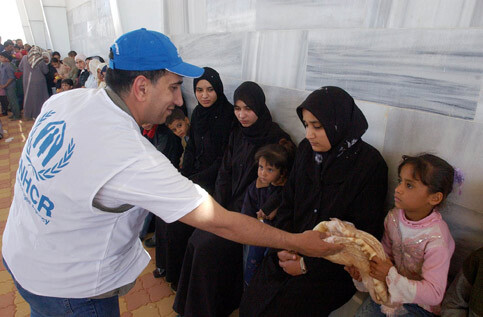IRIN 8 October 2006

A UNHCR staff member distributes food to Palestinian refugees on the Syrian-Iraqi border who fled violence in Iraq. (IRIN)
DAMASCUS - The Syrian Organisation for Human Rights in Syria (SOHR) said on Sunday that it was deeply concerned about “the deteriorating humanitarian conditions” of the Palestinians who are stranded on the Iraqi-Syrian border and who include about 150 children.
“Their lives in Iraq are in real danger because of lack of security,” SOHR told IRIN.
Among the stranded Palestinians is the Saeed family, which arrived at the Tanaf checkpoint on the border some five months ago after fleeing Iraq. As Palestinians, their lives in Iraq were in danger after they were targeted by unknown militants.
“I fled Iraq with my wife and my two-year-old daughter after I was threatened by unknown gangs that I would be killed,” said Jalal Saeed, 36, a driver from al-Zahranyah in Iraq.
“Our suffering is unbearable. The desert’s sun is scorching, and the cold in winter is intolerable. We only want shelter and security. It is impossible to return to Iraq,” he said, adding that he was concerned that the world appeared to have neglected their plight.
At present, there are 344 Palestinians at the Tanaf checkpoint and they are all reluctant to return to Iraq.
“It’s likely that the number would increase because the situation in Iraq is getting worse and worse,” said Laurens Jollens, acting representative of the United Nations refugee agency (UNHCR) which has provided food, water and medical care to the Palestinians.
The Syrian government has also provided the Palestinian refugees with medicine and doctors, according to one of their members who refused to be identified. “Still, we want a solution as the winter is approaching and there are daily dust storms,” he said.
“They [militants] warned all Palestinians to leave Iraq within 72 hours. [They asked] where shall we go? It’s better to stay here [on the Syrian border] than being killed there [in Iraq].”
Iraq’s ousted President Saddam Hussein had provided Palestinian refugees in Iraq with privileges, including free housing, stipends and government jobs. The largesse he showered them enraged many Iraqis, who coped with the deprivations of nearly 13 years of UN-imposed sanctions, which ended after Saddam’s ouster in 2003.
Scores of Iraqis attacked Palestinian homes in Baghdad after Saddam’s fall as Palestinians were seen as supporters of him. The attacks forced many Palestinians to flee the country or go into hiding.
Palestinians began flocking to the Tanaf checkpoint, some 306 km north-east of Damascus, last May, two days after Syrian authorities allowed 287 Palestinians who were stranded for two months on the common border to enter its territory in what Syria said was a “humanitarian” gesture.
Later, however, the Syrian Foreign Ministry said that it would not allow in additional Palestinians from Iraq. Still, the Palestinians have clung to the hope that the Syrian government might change its position, especially as winter is approaching and their children are still not in schools.
Syria appears to be reluctant to let them in, fearing that this would encourage other Palestinians who live in Iraq to head to Syria and thus overburden it. Already, Syria hosts about 500,000 Palestinians and more than 500,000 Iraqi refugees.
The UNHCR’s Jolles said that his agency has erected 85 tents in temporary camps at al-Tanaf. The refugee agency also assisted those Palestinians who had sought special medical treatment by sending them to Damascus and returning them to the border area after treatment.
“It’s a big problem and the refugees should be allowed in because they are facing the risk of persecution in Iraq,” said Jolles.
During her visit to Syria on 1 October, Karen Abu Zayed, the commissioner general of the UN Relief and Works Agency (UNRWA), said UNRWA was contacting concerned countries “to find a humanitarian solution to their suffering”.
“We have discussed the issue of hosting them anywhere and not necessarily in Syria or Jordan,” she said, adding that she had asked donor countries in Amman last month “to work to let them return to the Gaza Strip or West Bank [in Occupied Palestinian Territories]. It’s not necessary that Syria or Jordan should shoulder this responsibility.”
Related Links
This item comes to you via IRIN, a UN humanitarian news and information service, but may not necessarily reflect the views of the United Nations or its agencies. All IRIN material may be reposted or reprinted free-of-charge; refer to the copyright page for conditions of use. IRIN is a project of the UN Office for the Coordination of Humanitarian Affairs.